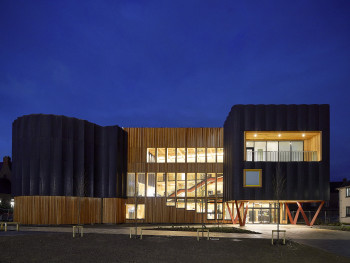Architecture is quite a unique profession in terms of the range of skills you realistically need as an individual to function. These include; the ability to draw, present, write (accurately), use a computer, understand physics and work with a wide range of people. When much of the world is edging towards specialisation, this presents a real challenge for gaining the adequate skills to become a good all-round architect.
For example, at secondary school level there is a risk that the breadth of learning will soon be severely limited by the new EBACC system. This will lead to the downgrading of arts subjects to have less worth than ‘core’ subjects, such as Maths or English. Whilst it may be understandable to concentrate on mastering the ‘basics’ in education, it cannot be a coincidence that our country has excelled at creative industries following a period when schools were able to teach a wide range of subjects with equal emphasis. Indeed, I am sure many who have ended up as architects were those at school who found themselves equally adept at both analytical and more creative subjects.
Beyond secondary education one could also claim that a narrowing of architectural education is failing to prepare students for practice. It is too easy to simply declare that students should learn more technical information, and frankly much of this is best learnt on an actual ‘real’ project. However, I do find it odd that the three main drivers for most projects in practice, the client brief, statutory issues (basically planning) and money, are barely discussed at university. I do understand the need to allow freedom of ideas in the academic setting and genuinely enjoy the type of debate that this can generate. But to never touch on some key project issues does seem to be just plain wrong, and can set a student up to be disappointed when they start to realise their ideas in the real world.
But the biggest issue, especially with regards to the future of architecture, has to be the lack of emphasis on teamwork in university education. Architecture is in many ways a team game; you need to be able to collaborate with consultants and other architect colleagues. The idea of a ‘Fountainhead’ architect was always a myth. Frank Lloyd Wright may be the best contender for this singular role, but when you read Reyner Banham’s analysis of his work in ‘The Architecture of the Well-tempered Environment’ you realise that he was always drawing on the ideas of colleagues and engineers to make his designs function. At architecture school the default setting generally is to emphasise individual achievement and grades, when we should be preparing students for working together and interfacing with other disciplines.
Once a year I teach a design and build course with a carpenter called Henry Russell as part of Dartmoor Arts Week. We take twelve students, fell some trees, mill them up and make a timber shelter, enclosure or folly. One of the things I really enjoy about the course is that there is no individual achievement, only team results. It takes students a day or so to realise this and ‘unpick’ the psychology of their usual learning environment; but I honestly think it comes as something of a relief to them to be able to work together for a common goal. And the sense of team spirit by the end is always fantastic!
So why is breadth of education and the ability to work in a team important for an architect? Well, architects have always needed to be good all-rounders and there is a risk that a narrow secondary or university education will restrict this. But in terms of collaboration, what is important now is that we ensure that our buildings have as low environmental impact as possible. With this in mind we inevitably need to work with specialists, as the field of sustainability is simply too large for any individual to fully comprehend. I think that there is a desire amongst younger architects to address this issue, and there are courses such as Bath University which are promoting inter-disciplinary collaboration. But this is not the norm, and we should be discussing now how to integrate working with others into our education; otherwise our profession risks being perceived as arrogant.



